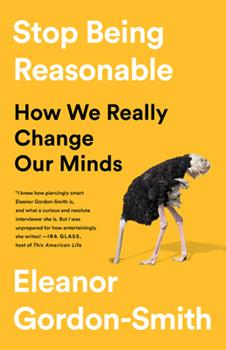“Stop Being Reasonable”
by Eleanor Gordon-Smith
“In Stop Being Reasonable, Eleanor Gordon-Smith weaves a narrative that illustrates the limits of human reason.
She chronicles the lives of people who radically altered their beliefs about the things that matter most–from the woman who realized her husband harbored a terrible secret; to the man who left the cult he had been raised in since birth; to the reality TV contestant who, having impersonated someone else for a month, discovered he could no longer return to his former identity.
What made them change course? How should their reversals affect how we think about our own beliefs? And in an increasingly divided world, what do they teach us about how we might change the minds of others?
Inspiring, perceptive, and moving, Stop Being Reasonable will completely change the way you look at the power of persuasion.”
Review from Jonnie Wolf in The Guardian
“The Australian philosopher Eleanor Gordon-Smith’s first book, Stop Being Reasonable, explores how we really go about changing our minds. Her approach is to probe six real-life stories of people who have had to radically rethink in high-stakes situations. Like Dylan, who, in a flash of insight, realises the apocalyptic cult that he was born into is bogus. Or upper-crust Alex, who appears on a reality TV show in which he has to fake it as a London bouncer and ends up with an unrecognisably new identity. Each story functions as “a miniature of a much larger complex sprawl”, and collectively they give a sense of the richness and strangeness of human reason.
The book came out of an item that Gordon-Smith produced for the radio programme This American Life. Her idea was to wander around a nightlife district of Sydney, wait for the predictable catcalls to start and then try to dissuade her catcallers from engaging in this type of behaviour again. But despite her orderly arguments, the catcallers left the conversations still convinced that it was “OK to grab, yell at, or follow women”. Gordon-Smith’s takeaway from the experience was that people are often unmoved by dispassionate logic, peer-reviewed research and statistics, but in fact are swayed by ego, emotion, self-interest and identity. If we want our public discourse to succeed in changing attitudes, Gordon-Smith insists, we have to ditch our idealised, sterile picture of persuasion and be more sensitive to how people behave in real life…”













